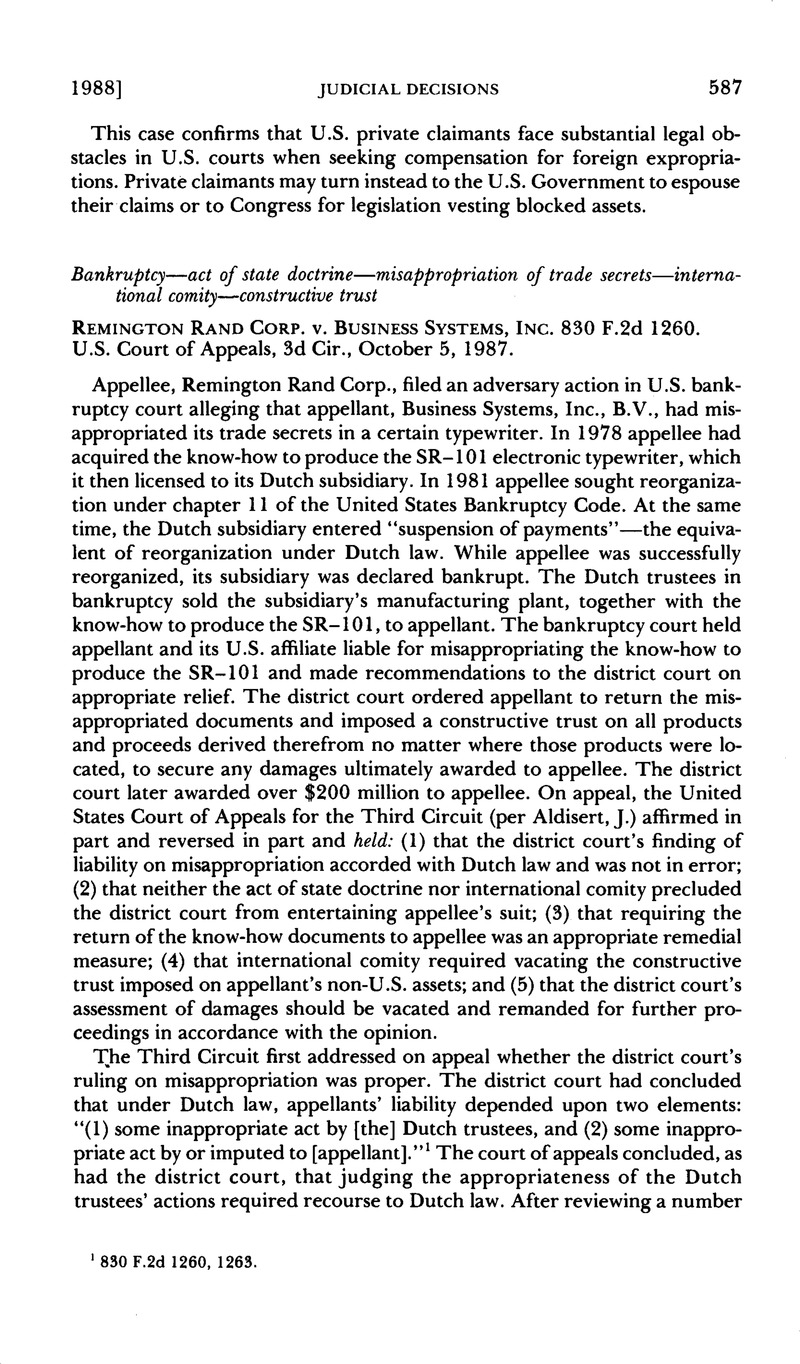Published online by Cambridge University Press: 27 February 2017

1 830 F.2d 1260, 1263.
2 Specifically, the court found that the trustees’ actions violated the Netherlands Civil Code, Article 1401, which, according to the Dutch Supreme Court, proscribes any act that “conflicts with . . . the duty of good care to be observed in social intercourse with regard to another’s person or goods.” Id. at 1264 (quoting Lindenbaum v. Cohen, 1919 NJ 161 (HR)).
3 Id. at 1265 (citing Mannington Mills, Inc. v. Congoleum Corp., 595 F.2d 1287, 1294 (3d Cir. 1979)).
4 Id.
5 The court of appeals alternatively held that the bankruptcy and district courts had not erred in denying comity to the Dutch court order since appellant did not have notice of, or an opportunity to be heard at, the Dutch proceedings, and was thus denied due process.
6 830 F.2d at 1269.
7 Id. at 1270.
8 Id. at 1271.
9 Id.
10 11 U.S.C. §304 (1982).
11 830 F.2d at 1271 (quoting Banque de Financement v. First Nat’l Bank of Boston, 568 F.2d 911, 921 (2dCir. 1977)).
12 Id. at 1272.
13 This procedure was first described in the early English case of Solomons v. Ross, “[k]nown from a scant note in 1 H. B1. 131 n., 126 Eng. Rep. 79 n. (1764), more fully reported in a note to Neale v. Cottingham (Irish Ch. 1770), reported in Wallis-Lyne, Irish Chancery Reports 54, 59 n. (1839).” 830 F.2d at 1273 n.5. In Solomons v. Ross, a Dutch trustee in bankruptcy laid claim to assets of an insolvent Dutch debtor that had been attached in London by an English creditor. The English court relinquished the assets to the Dutch trustee after receiving assurances that foreign and domestic creditors would be treated on equal terms under Dutch bankruptcy law.
14 At the first trial on damages, appellant argued that it could have recreated the know–how to produce the SR–101 from scratch in just 6 months, and that its tort liability must therefore be limited to only the “head start” it received by misappropriating the trade secrets. The district court refused to allow appellant to raise this “lead time valuation defense” as a sanction for failing to obey the court’s constructive trust order. In view of its determination that the constructive trust was too far-reaching, the court of appeals held that the sanctions formerly imposed against appellant—the imposition of attorneys’ fees and the denial of the lead time valuation defense—must be overturned. Accordingly, it ordered that the district court reassess damages, after giving appellant the opportunity to interpose the lead time valuation defense. On remand, however, the district court recently held that because appellant’s head start precluded appellee from entering the market, and because “appellee was denied and continues to be denied possession of the know–how documents despite the Orders of this Court,” the head start defense was not available to appellant as a matter of law. Kilbarr Corp. v. Business Sys., Inc., 679 F.Supp. 422 (D.N.J. 1988).
15 830 F.2d at 1273.